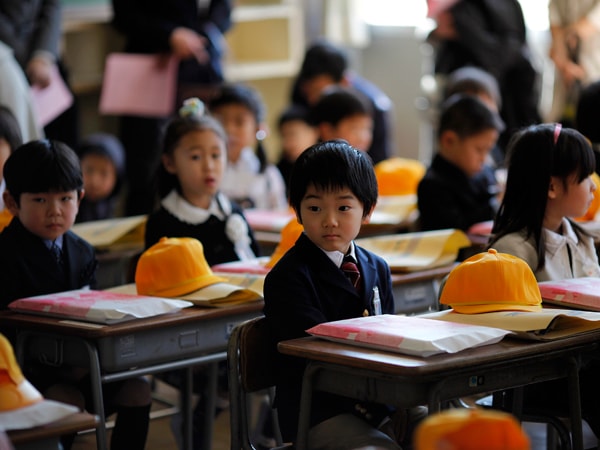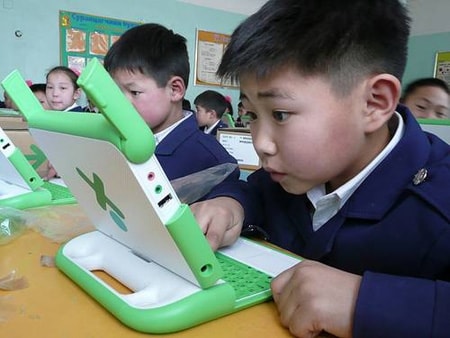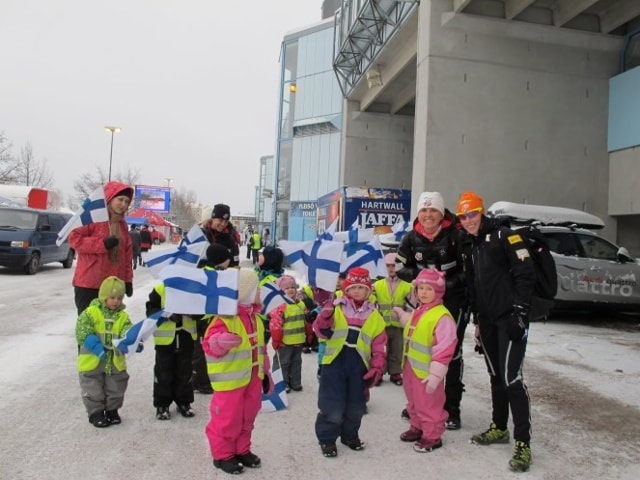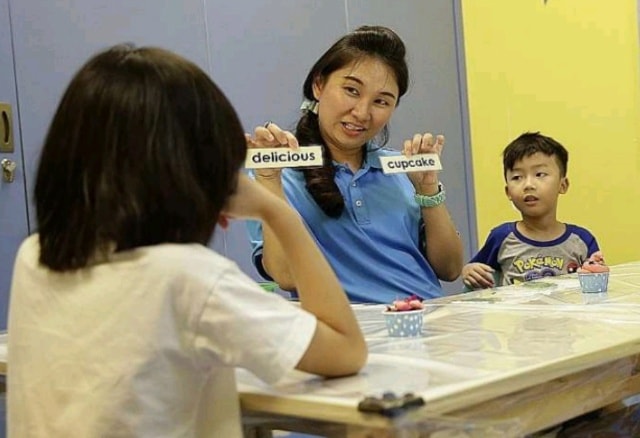How do countries around the world prepare their children for first grade?
(Baonghean.vn) - Not only in Vietnam but also in other countries around the world, parents also attach great importance to preparing their children for first grade. Let's find out how they prepare and choose schools for their children?
1. Japan
 |
| In Japan, education always encourages children to live independently from the first levels of school. |
Before starting school, parents will walk their children to school a few times to remind them of some situations that may arise and how to handle them appropriately, as well as to familiarize the children with the route to school.
In addition, to ensure safety, children will be specifically instructed not to loiter on the way to and from school; only take fixed routes, not to go on other routes; if they want to go out, they must go home to put away their books and ask their parents' permission; after school, teachers will check the areas in the schoolyard and classrooms to ensure no children are left behind, etc.
To prepare their children for first grade, Japanese parents also have to teach their children to be independent and aware of their responsibilities. Specifically, when waking up early in the morning, children must know how to fold their own blankets, do personal hygiene, then eat breakfast and prepare school supplies to go to class. Children can go with friends, walk, talk and enjoy the surrounding scenery happily and excitedly.
2. America
 |
| In America, the process of preparing children for first grade is not as easy as in Vietnam. |
In the US, students in the senior kindergarten class will be “pre-schooled” in the program. They are taught and learn all four skills of listening, speaking, reading, and writing (learning letters, writing sentences, and doing math) before entering grade 1. The grade 1 program is a continuation, not a repetition, of this senior kindergarten class. To achieve the above requirements, teachers in charge of senior kindergarten classes in the US fully comply with the regulations of the Board of Education of that state.
When children enter the preparation stage for first grade, parents in the US must go through the process of choosing a school to apply for their children. However, children will be tested to assess their abilities. After the results are available, the homeroom teacher will have a private meeting with the child and parents on the first day of the year to set goals for the entire school year based on the child's wishes, abilities and the parents' monitoring.
During the time preparing for their children to enter first grade, parents also let their children take extra classes such as ballet, guitar, piano or sports classes such as swimming, volleyball, basketball, football, chess, etc. to help their children practice from a young age. According to the US education policy, if after finishing high school, children have a talent for sports, universities will "roll out the red carpet" and grant scholarships for direct admission to the school.
3. Canada
 |
| Canadian students enjoy free education from age 4 until age 18. |
Like many other countries with advanced education, when preparing for their children to enter first grade, parents only need to choose a school for their children, but in Canada, the difference is that children can study completely free of charge. Books for children to study can also be borrowed from the school library. Parents only need to buy school supplies for their children, snacks and lunch for them.
Before your child enters school, parents will attend a presentation on new teaching methods and brain development from experts. Parents will understand how to best develop their child's brain and accordingly will have a suitable learning program, not forcing the child to study too much.
In addition, when preparing for first grade, parents also need to consider their financial ability to let their children participate in after-school programs such as home economics classes, physical education, and appropriate art subjects.
4. China
 |
| Many Chinese children have a busy schedule of extra classes before entering first grade. |
Despite new regulations, many Chinese parents still force their preschool-age children to attend extra classes to prepare for primary school.
Supplementary tutoring centers for kindergarteners are very popular in China. Most centers are always full of students. Parents say they enroll their children in these classes because they want to better prepare them for first grade.
Some parents also said that there is an elementary school that requires students to complete 60 math questions in 5 minutes. They said that without extra learning beyond the kindergarten curriculum, students will have difficulty keeping up with the program when they enter elementary school.
5. Federal Republic of Germany
 |
| While Vietnamese children have to learn all kinds of things to prepare for first grade, children in Germany can play freely. |
According to government regulations, preschool education is optional for all children aged 3 to 6, which is not part of the German education system. If children do attend preschool, the kindergartens or “kitas” in Germany do not place much emphasis on education.
In fact, both teachers and parents discourage their children from learning to read too early. They believe that children can learn to read together when they start first grade. Therefore, children in German kindergartens are not taught to read and write until they are 6 years old.
In Germany, when studying in grade 1, children are not forced to study too hard, they study like playing and play like studying. Usually, schools here always spend half a day teaching with 2 breaks for outdoor play. In class, children start to learn letters, numbers, color... and especially are not forced to hold a pen with the right hand, write upright or diagonally. In addition, children also learn and practice how to behave with parents, teachers, adults, friends, are trained to be confident and bold, practice speaking, discussing, and arguing in front of a crowd.
6. Netherlands
 |
| Finnish students begin basic education at age 7. |
Primary school students arrive at school at 9:30, and at 10:30 they have lunch for about an hour. This arrangement is to ensure that the older classes can use the cafeteria. At 11:30 they go to class and at 12:30 they leave school.
Morning and afternoon activities for grade 1-2 students usually include leisure activities (usually sports or practical skills, the ability to express oneself through words and pictures, music, daily chores and knowledge in other areas. Participation is voluntary and not compulsory.
Reading skills are considered the most important for primary school students in Finland. Therefore, during class, every week, a parent will come to class to read books to and listen to the children read. The parent must sit and read books to the child until they memorize stories from everyday life, history to religion.
In Finland, it is illegal to test primary school students. Teachers evaluate students based on their own development, not by comparing them with other students. Most of the teachers' comments are through continuous communication rather than giving out numerical scores like in Vietnam.
7. Singapore
 |
| Kindergarten children in Singapore are taught how to form English sentences in transition classes. |
Parents often worry when their children start primary school, worrying that they will have difficulty adapting to the new environment and not be able to keep up with the curriculum. In Singapore, the solution to this problem is transition classes.
Many Singaporean parents choose to enroll their children in transition classes from kindergarten to Primary 1. These classes are usually run by education centers. Most children in these classes are 6 years old and are preparing for Primary 1. These are short courses that focus on a number of specialized topics, including English, Chinese and Mathematics.
The number of students in each class is usually small, just a small group of students. The children are introduced and explained some important concepts of the first grade program. In addition, teachers at the centers also point out the children's misconceptions about primary school. This method can help children adapt quickly when officially entering first grade./.
Peace
(Synthetic)
| RELATED NEWS |
|---|








